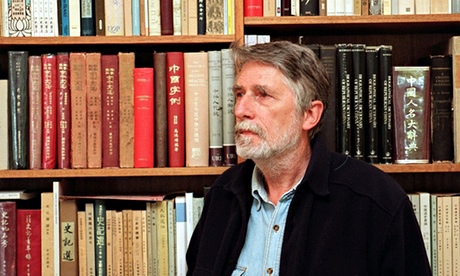
The Belgian author and scholar of China Pierre Ryckmans, who has died aged 78 of cancer, was more widely known under his pen name of Simon Leys. His diary dissecting Maoism and the cultural revolution, Les Habits Neufs du Président Mao (The Chairman's New Clothes, 1971), echoed the title of the Hans Christian Andersen fable and made its thesis plain in its first few words. The cultural revolution, he said, had nothing revolutionary about it except the name and nothing cultural about it except the initial tactical pretext: "It was a power struggle waged at the top between a handful of men and behind the smokescreen of a fictitious mass movement."
This pioneering attack on the cultural revolution and its associated mythology did not initially create a great stir, even in France, where the cult of Mao had reached rare heights. Le Monde gave it a brief and condescending mention, saying that, while some facts were accurately reported, there were mistakes and information that could not be checked. Sources, it said, were not usually quoted and the author clearly had no experience of that of which he spoke. Others were less charitable, accusing Ryckmans of being a CIA agent, and the book became steadily more controversial, the more so when a later volume, Ombres Chinoises (1974, translated as Chinese Shadows, 1976), appeared, in which Ryckmans made plain his contempt for the gullible but ignorant self-appointed sinophiles who were treated to visits to China during which they were shown nothing of the real life of the masses with whom they felt such empathy.
Born in Brussels, he studied law and art history at the Catholic University of Louvain. His contact with China began when he was 19, one of a delegation of young Belgians invited to the country on a trip that included a meeting with Zhou Enlai, the premier under Mao. As he put it: "My overwhelming impression (a conclusion to which I remained faithful for the rest of my life) was that it would be inconceivable to live in this world, in our age, without a good knowledge of Chinese language and a direct access to Chinese culture."
To that end, he spent 12 years in the far east, in particular Taiwan, Singapore and Hong Kong, where he became an acknowledged expert on Chinese painting, calligraphy and poetry. In Hong Kong he monitored the Chinese press on behalf of Belgian diplomats. He was invited to teach at the Australian National University in Canberra in 1970, and adopted his pen name for his first book so that he would be able to re-enter China. In 1972, he was given a six-month attachment to the Belgian embassy in Beijing, an experience that provided the material for Chinese Shadows. But then a fellow sinologist identified Simon Leys as Ryckmans, thereby ruling out any further return to the country whose culture and people he venerated.
He later taught at the University of Sydney, and continued to write. Fluent in French, English and Chinese, he had a wide intellectual hinterland, including authors as varied as George Orwell, GK Chesterton and the 20th-century Chinese writer Lu Xun. He was fascinated by the sea and wrote a well-received account of a 17th-century nautical disaster, The Wreck of the Batavia (2005).
His novella The Death of Napoleon (1991) was filmed as The Emperor's New Clothes, with Ian Holm in the title role. The play on the Andersen title this time referred to an imposter remaining imprisoned on St Helena while Napoleon returned to Paris, but Ryckmans was disappointed by the production.
He was not afraid of controversy and had a well-publicised row with the late Christopher Hitchens in the New York Review of Books over comments Hitchens made about Mother Teresa.
Ryckmans lived in Australia for more than four decades, but retained his Belgian nationality. He is survived by his Taiwanese wife, Hanfang Chang, three sons and a daughter.
• Pierre Ryckmans (Simon Leys), scholar of China and writer, born 28 September 1935; died 11 August 2014

